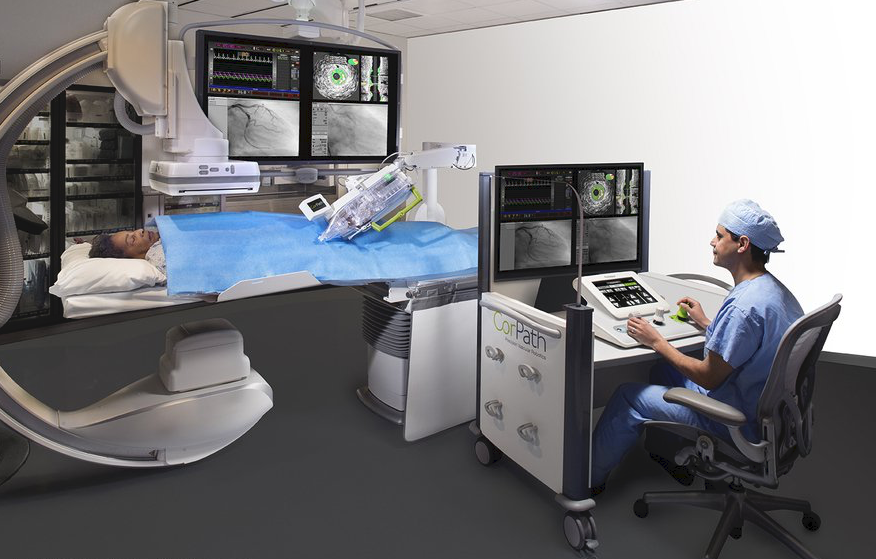An Indian Surgeon Performed The First Long-Distance Heart Surgery
Harin - Sep 08, 2019

A series of five PCI (percutaneous coronary intervention) procedures were recently performed by an Indian surgeon on patients who were 20 miles away.
- This Smart Bandage Will Heal Wounds That Can't Heal Without Requiring The Patient To See The Doctor
- These Brain Implants Could Electrocute People Out Of A Coma
- Dentist Stripped Of License For Riding A Hoverboard While Operating On Patient
A series of five PCI (percutaneous coronary intervention) procedures were recently performed by an Indian surgeon on patients who were 20 miles away. The event marks the first-ever long-distance heart surgery.
The patients were suffering from atherosclerosis, where there is plaque building up in the human’s blood vessels, restricting blood flow. With this special procedure, a small instrument known as a stent was inserted by the CorPath GRX robot to help open up the heart’s blood vessels.
The robot was actually a product of a company called Corindus. The paper could be found in EClinicalMedicine. The surgery which was carried out is a part of telemedicine.

Telemedicine, by combining robotics, communications, and mixed reality, allows medical experts to reach patients in remote areas. Healthcare could soon be decentralized to cope with doctor and nurse shortages.
The groundbreaking procedure was carried out by Dr. Tejas Patel, Ahmedabad Apex Heart Institute’s Chairman and Chief Interventional Cardiologist. To carry out the procedure, the team set up an identical remote workstation in Patel’s location.
A high-speed internet connection helped connect the station to the robot. In the operating room, there were cameras installed so that Patel could have additional views.
In a press statement, Corindus Vascular Robotics’ President and Chief Executive Officer Mark Toland, said that remote procedures could help transform the way we deliver care in treating critical and time-sensitive diseases like stroke and heart attack.
He continued,

Toland concluded by saying that although robotic procedures’ development is still in the early stages, we are right on track to provide patients with more access to care, as well as reducing the time needed to receive treatment.
The telemedicine field is not something new. Back in 1999, the Ames Research Center of NASA set up one of the first virtual clinics to offer astronauts who were on the International Space Station medical care.
Telemedicine was also used by the U.S. military to treat injured soldiers on faraway battlefields.
Featured Stories

Features - Jan 29, 2026
Permanently Deleting Your Instagram Account: A Complete Step-by-Step Tutorial

Features - Jul 01, 2025
What Are The Fastest Passenger Vehicles Ever Created?

Features - Jun 25, 2025
Japan Hydrogen Breakthrough: Scientists Crack the Clean Energy Code with...

ICT News - Jun 25, 2025
AI Intimidation Tactics: CEOs Turn Flawed Technology Into Employee Fear Machine

Review - Jun 25, 2025
Windows 11 Problems: Is Microsoft's "Best" OS Actually Getting Worse?

Features - Jun 22, 2025
Telegram Founder Pavel Durov Plans to Split $14 Billion Fortune Among 106 Children

ICT News - Jun 22, 2025
Neuralink Telepathy Chip Enables Quadriplegic Rob Greiner to Control Games with...

Features - Jun 21, 2025
This Over $100 Bottle Has Nothing But Fresh Air Inside

Features - Jun 18, 2025
Best Mobile VPN Apps for Gaming 2025: Complete Guide

Features - Jun 18, 2025
A Math Formula Tells Us How Long Everything Will Live
Read more

ICT News- Feb 18, 2026
Google's Project Toscana: Elevating Pixel Face Unlock to Rival Apple's Face ID
As the smartphone landscape evolves, Google's push toward superior face unlock technology underscores its ambition to close the gap with Apple in user security and convenience.

Mobile- Feb 16, 2026
Xiaomi Launches Affordable Tracker to Compete with Apple's AirTag
For users tired of ecosystem lock-in or high prices, the Xiaomi Tag represents a compelling, no-frills option that delivers core functionality at a fraction of the cost.

Mobile- Feb 17, 2026
Anticipating the Samsung Galaxy S26 and S26+: Key Rumors and Specs
The Samsung Galaxy S26 series is on the horizon, sparking excitement among tech enthusiasts.
Comments
Sort by Newest | Popular